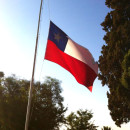Constant Adventures for a Gringa in Santiago! Past Review
By Carson T (Marketing And International Business, Villanova University) - abroad from 03/01/2013 to 07/12/2013 with
CIEE: Santiago - Business + Culture
The amount I gained or learned from this experience couldn't possibly be detailed in this box, and I don't claim to be intelligent enough to articulate it all. I learned more about myself and other people that I could have ever asked for and changed in ways that I can't wait to bring back to the United States. Saying my experience in Santiago was worthwhile is a serious understatement to the gifts this time has given me!
Review Photos




Personal Information
| How much international exposure did you have prior to this program? | 0-2 weeks |
Review Your Program
|
* Overall educational experience
Academic rigor, intensity, resources, etc. |
With this program I had the opportunity to enroll in classes in the best business school in Chile, FEN of U de Chile. My professors were knowledgeable and experienced and enthusiastically conveyed their courses material to us as students. The academics were rigorous but not overwhelming which was a nice combination to keep us focused but also give us freedom in our semester abroad. |
|
* Host Country Program Administration
On-site administration of your program |
The people in the office at CIEE Santiago are wonderful. Constantly available and in touch and with a wealth of resources at their disposal. |
|
* Housing:
How satisfied were you with your living arrangements? |
My living arrangements and host family were more than adequate, a very nice home to live in for the semester, in a particularly wealthy part of town. The only drawback is the distance away from my university, it took me 45 minutes on average to get to classes. (the case with most suburban homes in Santiago Chile) |
| * Food: |
The food of Santiago Chile is bland and lacking in culture, but the few dishes that are distinctly Chilean are tasty if prepared by the right cook. The Nana in my host house made very good dinners and there was always enough to go around. Chileans eat a lot of hotdogs and use a lot of mayonnaise, two concepts as an American I thought were interesting and distinct. |
|
* Social & Cultural Integration:
How integrated did you feel with the local culture? |
Chile was WONDERFULLY accepting of foreigners (except the occasional targeting for pickpocketers) and I was immediately accepted into groups of families and friends. The local culture of Santiago is similar to any big city, easy to assimilate into for those who have experience with such in the United States. Chilean boys our age and a bit older were very welcoming (as expected with American girls) whereas Chilean girls our age tended to keep to themselves and their groups of friends. |
|
* Health Care:
How well were health issues addressed during the program? |
I did not have any experience with the health care in Chile, and did not need any vaccines. The general health knowledge of the Chilean people is a bit outdated. |
| * Safety: |
Santiago was extremely safe, except for pickpocketing or theft. Most students I knew in Chile had something stolen from them or a friend, myself included, simply because foreigners are easy targets for crimes such as this. The only danger I witnessed was involved in the protests of the city, the people of Santiago are very politically active and hold several protests and "paros" in order to show this. We were adequately warned by our program and school to avoid certain areas and certain times. Other than that, even in the middle of the night, Santiago is one of the safest cities I've ever seen. |
| If you could do it all over again would you choose the same program? |
Yes
|
Finances
|
* Money: How easily were you able to live on a student's budget?
(1 = not very easy/$200+ on food & personal expenses/week, 2.5 = $100/week, 5 = very easily/minimal cost) |
Living in a host family, everything house related is very inexpensive in Santiago. That being said, I used public transportation everyday at a price of $1.50 per ride, and nightlife or activities in Santiago are not cheap (even though the majority of Latin America believes the US to be more expensive) Santiago's prices for commodities seemed to me to be close to twice as high as comparable items in the United States- items such as water bottles, beer, clothing, restaurant meals, shoes, etc.) |
| Not including program expenses, about how much money did you spend on food and other expenses each week? | $40 |
| Do you have any general money-saving tips for future study abroad participants? | Bring at least $350 dedicated to public transportation alone for a semester long trip! |
Language
| * Did your program have a foreign language component? | Yes |
|
How much did the program encourage you to use the language?
0 = No encouragement, 5 = frequent encouragement to use the language |
CIEE encourages the use of Spanish everyday, and it is helpful and useful to know the language in Santiago Chile. |
| How would you rate your language skills at the beginning of the program? | Intermediate |
| How would you rate your language skills at the end of the program? | Advanced |
| What was the highest level language course you had completed prior to departure? | Advanced Spanish |
| How many hours per day did you use the language? | |
| Do you have any tips/advice on the best ways to practice the language for future study abroad participants? | Practice speaking! The comfort with actually using the language is very different than that of writing and reading and possibly the biggest improvement in my language since being in Chile. |
Other Program Information
|
* Where did you live?
Select all that apply |
|
|
* Who did you live with?
Select all that apply |
|
|
* Who did you take classes with?
Select all that apply |
|
| About how many local friends did you make that you will likely keep in touch with? |
A Look Back
| * What did you like most about the program? |
|
| * What could be improved? |
|
| * What do you know now that you wish you knew before going on this program? | I wish I had been told to "relax, your Spanish will be fine, and you'll learn a lot!". I also WISH I knew anything about my host family before I got here! I wanted to bring them appropriate gifts and know what I was getting into, but instead I did not and felt a little under prepared. |
Reasons For Studying Abroad
| To help future students find programs attended by like-minded individuals, please choose the profile that most closely represents you. |
The Avid AdventurerThe wardrobe you packed was better suited for a semester of camping than club hopping. Outdoorsy, you might forgo a crazy night out for an early all-day adventure. You'd rather take in the rich culture of an old town than the metropolis of a modern city, but for you getting off the grid is ideal. |
Individual Course Reviews
| Course Name/Rating: |
International Management |
| Course Department: | Management |
| Instructor: | Gerla Van Bruegel |
| Instruction Language: | English |
| Comments: | This class was an overview of topics related to International Business in a Management perspective. It was challenging in that the professor demanded daily attention and readings yet engaging because the material was relevant and informative. The professor is young, dynamic and knowledgeable, teaching from experiences and learning along with the class. Several of the assignments in this class will actually add to your International Business careers making the course even more significant in the lives of students abroad. |
| Credit Transfer Issues: | No issues, easily transferable with internationally based Management classes. |
| Course Name/Rating: |
International Monetary Concepts of Trade |
| Course Department: | Economics |
| Instructor: | Manual Agosin |
| Instruction Language: | English/Spanish |
| Comments: | This course was by far the most difficult one offered to International Students wishing to take classes in English. The class is lectured in English, the notes and half of the readings are in Spanish (in complicated, economic jargon), and the communication from the students in the class is Spanish. The class consists of 6 papers and a final exam, the 6 papers having to do with topics generally discussed in class, and the not the topics on the final exam. Grading is harsh and wildly erratic, as I found spending time or rushing through papers did not change the grade I received accordingly. That being said, except for the final, the day to day class is relatively easy with no work requirements if you are able to translate back and forth in high level economics. |
| Credit Transfer Issues: | Transferred for Global Political Economy, no issues. |








